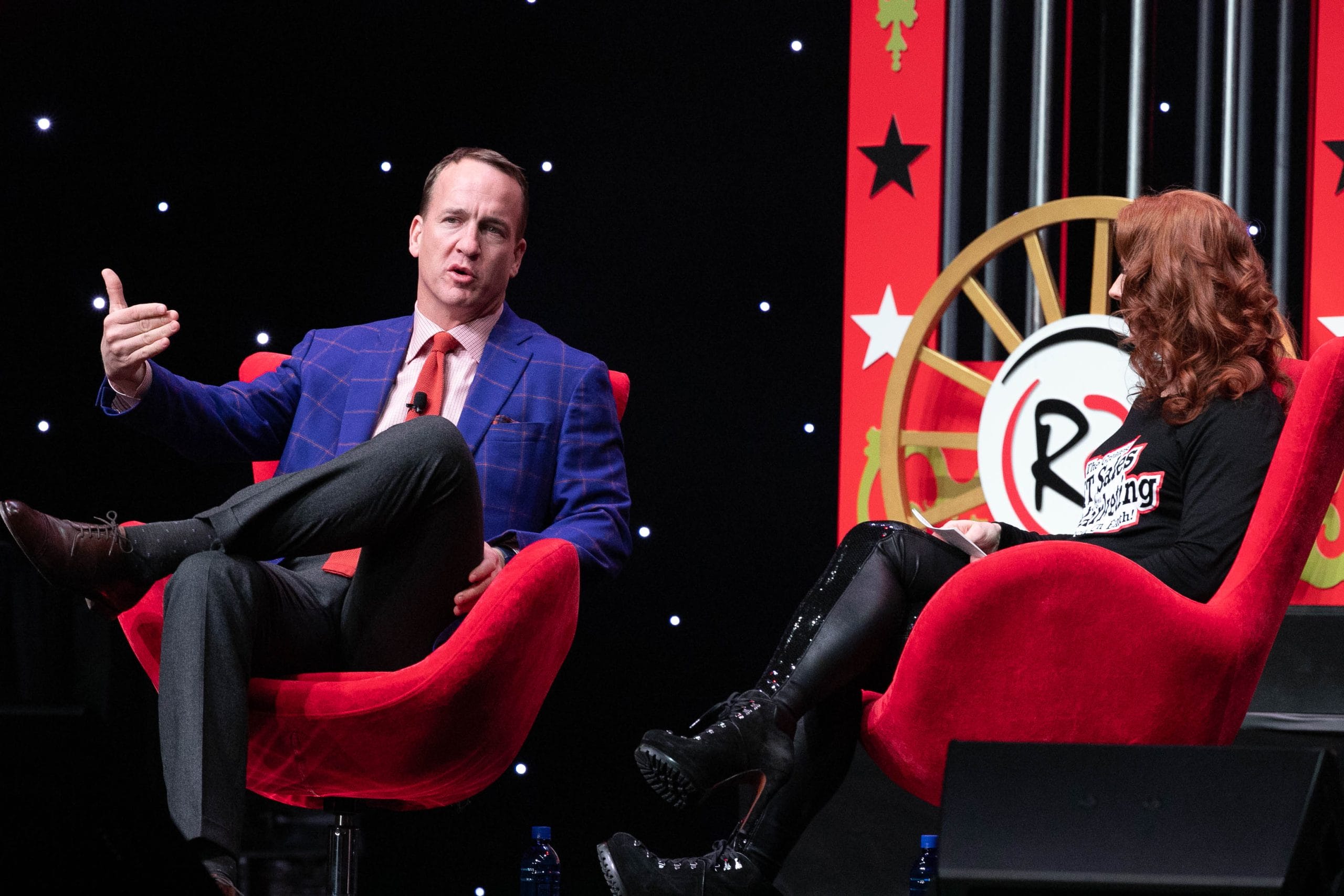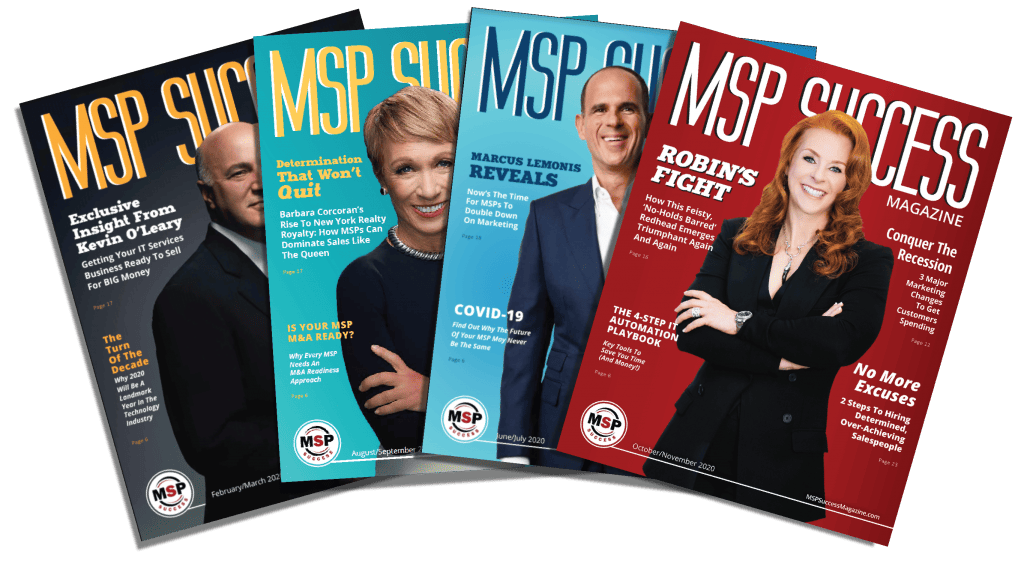If there’s anyone who knows what it takes to develop and sustain success, it’s Peyton Manning. During his 18 seasons in the NFL, Manning broke nearly every passing record imaginable, won two Super Bowls, and was named NFL MVP a whopping five times, which is more than any other player in league history.
A surefire first-ballot Hall of Famer, Manning will go down in history as one of the greatest to ever put on a helmet. Even in his second semi-career as a commercial spokesperson, he’s been a winner. His folksy, aw-shucks humor and willingness to poke fun at himself is a breath of fresh air in a world of celebrities who take themselves way too seriously.
Earlier this year, Manning sat down with Robin Robins of Technology Marketing Toolkit to share some thoughts on what he considers to be the essential traits of a leader, the pillars of growth, the link between football and business, and what it takes to be a champion.
The 4 Essential Factors Of Success
Manning identifies four key characteristics that allow people to succeed in their given career. “Well, in any field, you certainly have to have ability,” he says. In the world of MSPs, that ability comes in the form of technical savvy and expertise. If you can’t protect your clients’ networks and quickly remedy problems when they do arise, all the customer service skills in the world won’t save you. To use a well-worn phrase from one of Manning’s old nemeses, New England Patriots coach Bill Bellichick, you have to be able to “do your job.”
Of course, ability alone is not enough. We’ve all heard stories of hypertalented people who never lived up to their full potential. “I think you have to combine that ability with a strong work ethic,” Manning continues. “When you combine those two, you have a chance to separate from the rest of the pack.” Ability plus work ethic equals growth. It’s just that simple. Once you recognize you have the talent to do something, you cannot become complacent or assume you have all the answers. Manning continued to learn throughout his nearly two-decade career, and adopting the mindset of a perpetual student is just as valuable to business owners.
“The third thing that will bring you a notch higher is just a real passion,” he adds. “You have to love your job. If you don’t, it will show up.” Manning notes that he and his brother, Eli, another championship quarterback, would’ve played football for free. There are an infinite number of businesses you can start, and there are countless ways to make money. If you don’t pursue an avenue you genuinely care about, work becomes monotonous in a hurry. One last component gives you the recipe for a winner.
“The fourth thing,” Manning concludes, “is just a sense of accountability. People are counting on you, and you don’t want to let them down.” You have to take the blame for your failures and be a person of your word if you want to nurture a team for the long haul. You can’t hide or shuffle responsibility onto others, which brings us to our next point.
The Mantle Of Leadership
“I learned my first lesson in leadership in a very embarrassing fashion,” Manning recalls. As a freshman at the University of Tennessee, Manning was pulled from the sidelines after the starting quarterback was injured. Thrust into a huge moment, Manning attempted to take control of the huddle by being a vocal leader. As he attempted to rally the troops, he was quickly shut down by a senior offensive lineman. Some choice words about shutting up and calling the play were exchanged, humbling Manning in a hurry.
“These teammates didn’t want to be talked to until I walked, if you will — until I earned my respect.” Even for those with innate leadership abilities, Manning’s story demonstrates a very important lesson. Many of you reading this magazine have probably worked for new managers who show up on day one thinking they’ve got it all figured out. They attempt to empower the people underneath them, but it feels forced or hollow. They don’t know the ins and outs of their new environment, and they certainly don’t know the needs and motivations of their team. Taking the time to learn and perform before you lead earns you respect and shows that you don’t expect influence to be handed to you as a matter of course.
It would be easy to assume that Manning is a born leader, and to a certain extent, he is. But that doesn’t mean that he hasn’t honed and refined his skills over the years. “People who cultivate the influence to lead, they grow,” he states. Cultivating this influence requires both excelling at your role and understanding how you can become a better leader to those around you. If Manning wasn’t a great quarterback, he wouldn’t be so accomplished as a leader. However, not all great quarterbacks are natural and confident in their leadership abilities. It’s when the two dovetail together that the real magic happens.
The Importance Of Being Prepared
If there’s a signature quality Manning is known for, it’s his obsessive attention to detail. The tales of his film study and football IQ are the stuff of legend. “Preparation is where I felt I could get an edge on the competition,” he reveals. “I thought I could out-prepare anybody.”
In treating practice as if it were the fourth quarter of a Super Bowl and in spending hours running through every possible scenario he might face on the field, Manning was able to remain calm and composed in moments that would overwhelm most of us. He remembers his dad, Archie, sharing a quote from former Pittsburgh Steelers coach Chuck Noll with him at a very young age. “Pressure is what you feel when you don’t know what you’re doing,” Noll said. In the world of IT services, high-pressure moments are going to arise. When your clients need you to act quickly and decisively, you can’t buckle in the face of tough odds.
It’s what you do day in and day out that will prepare you to handle these pressure-cooker moments. Even one of Manning’s most famous skills, the way he made last-second audibles at the line of scrimmage to dissect a defense, is not as improvised as it may appear. “Calling an audible, making a change in whatever it is you’re doing, comes down to dogged preparation,” he asserts. “Every audible I ever called, we practiced it; we talked about it. Everybody’s got to be on the same page. We were prepared. Winging it is not a good idea in any field.”
Another easy example of this interplay between preparation and inspiration can be found in jazz music. Jazz is a famously improvised genre of music. Many of the music’s most iconic moments were not sketched out on sheet paper but instead came about when the bands were interacting organically in the moment. But this is only possible through a rock-solid understanding of fundamentals. Otherwise, it would be impossible for bandmates to intuit where a soloist is heading and follow them to the heights of genius.
It’s not hard to see how the value of preparation extends beyond the gridiron or the studio. In business, innovation and creativity can lead to great accomplishments. However, you don’t just wake up and decide to innovate. You get there by working hard, understanding your industry, and identifying areas for improvement.

















